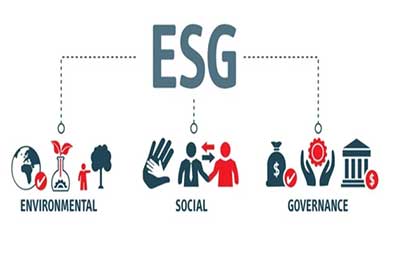Relevance: GS-3: Conservation, environmental pollution and degradation, environmental impact assessment
Key Phrases: Panchamrit, United Nations Principles for Responsible Investment (UN-PRI), COP-26 and IPCC 6th report,pension funds and sovereign wealth funds, Greenwashing
Why in News?
- After, COP-26 and IPCC 6th Report, investors are re-evaluating traditional approaches and look at the impact their investment has on the planet.
- As a result of this paradigm change, asset managers have started incorporating ESG factors into investment practices.
- Countries and Companies with good ESG scores are considered favourable destination for investment.
- Recently, the United Nations Principles for Responsible Investment (UN-PRI) (an international organization) appealed to global investors for the incorporation of ESG factors into investment decision-making.
What is ESG Concept?
- ESG means using Environmental, Social and Governance factors to evaluate companies and countries on how far advanced they are with sustainability.
- ESG investing is used synonymously with sustainable investing or socially responsible investing.
- So, the concept is driven by idea of environment-friendly practices, ethical business practices and an employee-friendly record.
What is ESG Fund ?
- ESG fund is a kind of mutual fund. Its investing is used synonymously with sustainable investing or socially responsible investing.
- While nominating for investment, the ESG fund shortlists companies that score high on environment, social responsibility and corporate governance, and then looks into financial factors.
- Therefore, the key difference between the ESG funds and other funds is 'planet health conscience' i.e the ESG fund focuses on companies with environment-friendly practices, ethical business practices and an employee-friendly record.
- In India, this fund is regulated by Securities and Exchange Board of India (SEBI).
Benefits
- As ESG funds gain momentum in India, companies will be forced to follow better governance, ethical practices, environment-friendly measures and social responsibility.
- Companies that do not adjust their business strategies or become more environmentally sustainable could have the its revenue and profitability suffer in the long term as the policy framework changes.
- Many pension funds and sovereign wealth funds around the world avoid investing in companies that are considered to be polluting or socially irresponsible.
What are the concerns?
- One of the biggest worries among global institutional investors is greenwashing. Greenwashing is defined as an unsubstantiated claim in order to mislead customers into believing that a company's products are environmentally friendly.
- Capitalism driven by profitability and so will always favor certain stocks and companies, despite the fact that these companies have fallen short of the qualitative and quantitative standards used for ESG.
Way Forward
- Being ESG compliant enhances the company’s credibility and reputation several fold and is sure to attract investors due to their sustainability.
- ESG further compliment the Panchamrit Principles given by India to become Net Zero Emission by 2070.
- ESG is a noble path which asserts how development and environmental conservation can go hand in hand.
Source: Indian Express
Mains Question:
Q. The concept like Environmental, Social and Governance (ESG) can revolutionize the capitalism with more environmental outlook approach and can synergies the triple unity of people, planet and profit. In this context, explain the concept of ESG, and how it can help India to achieve its Net Zero Emission target by 2070. (15 marks)









